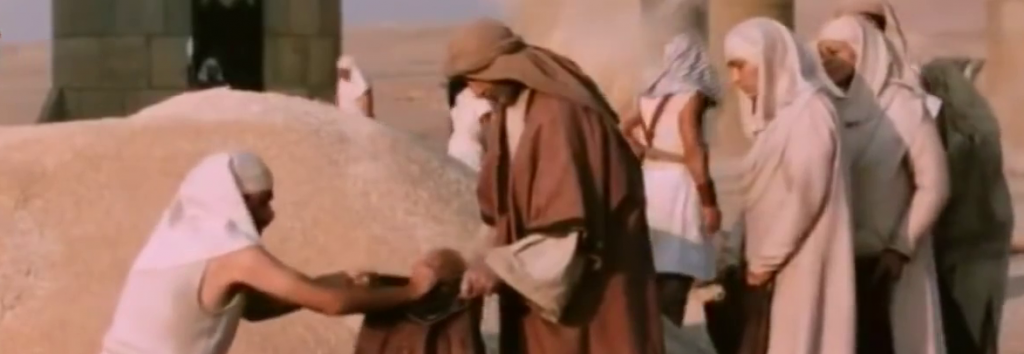Synopsis. The seven years of famine have begun. People across Egypt are wondering why they woke up hungry in the middle of the night, and why their plants have begun to wilt. Zuleikha, in addition to all her other recent losses, is beginning to go blind and finds it difficult to walk without falling. In Canaan, Jacob’s eyes have begun to dim, too, but he hears that the Egyptians are benefiting under a leader whose name sounds similar to Joseph. Back in Egypt, Zuleikha’s servants are unable to get grain for their mistress, because only the poor can get grain for free — so Zuleikha sets her servants free so that they will at least be able to get grain for themselves. Zuleikha, all alone in her palace, works through her tortured emotions in a long, long monologue.
As the 34th episode begins, the priests of Amon come before the Pharaoh to insist that they be given wheat for free, or at least that they not be charged exorbitant rates for it. Joseph tells them to buy wheat from other countries — and then privately tells the Pharaoh that the other countries are beginning to experience famine too. In Canaan, Joseph’s brothers notice that the crops are not what they used to be. Back in Egypt, the queen mother Tiye tells her son she hopes the palace will be ruined for its offenses against the god Amon. Once she’s gone, Akhenaten and Nefertiti say they hope monotheism will become the official religion of Egypt. Two of Zuleikha’s former servants get some grain and find themselves walking back to her palace, so they offer to share their grain with her. Zuleikha calls the curse of Joseph’s God against Amon, then asks if her servants saw what she did. One of them says Amon deserved it.
Differences from Genesis. The biblical Joseph reduced the population of Egypt to slavery and took possession of all their property during the famine, while giving the priests of Egypt a regular allotment of free food (Genesis 47:13-26). But the Joseph of this series uses the famine to undermine the Egyptian priests and the public’s support for them, and he lets the farmers keep the animals and the property that they are supposedly giving to the government in exchange for grain. Malek remarks that it is odd to give wheat in exchange for things but not seize the actual things, and the Joseph of this series replies that they need to “revolutionize Egypt” by taking power away from the rich and boosting the status of the lower classes — which is precisely the opposite of what happened during the famine under the biblical Joseph.
The biblical Joseph was given the name Zaphenath-Paneah by the Pharaoh (Genesis 41:45), but the Joseph of this series has been called “Yuzarsif” ever since he was purchased by Potiphar, and that is the name he continues to use as Egypt’s governor. The difference between his Egyptian name and his birth name becomes a point of minor significance on two occasions in these episodes: in one scene, Jacob hears that Egypt is being governed by a man named Yuzarsif, and he smiles at the name’s similarity to Joseph; and in another, Zuleikha is standing in the crowd and shouts Joseph’s birth name as his chariot goes by, thinking — correctly — that she will stand out from all the other people who are shouting his Egyptian name. (And then she hides her face when Joseph scans the crowd to see who used his birth name.)
Pious Joseph. Joseph chastises his charioteer when the chariot rides a little roughly through the streets and endangers the pedestrians. Joseph reminds him that they are the people’s servants, and they should not be imperious like the soldiers of Amon.
The supernatural. People across Egypt wake up hungry in the middle of the night, and various plants wilt overnight, because the seven years of famine have started.
God versus the gods. As Joseph puts it, the fight against idolatry is “entering a new level” now that the famine has begun. Some of the people in charge of distributing the grain mock the priests because Amon isn’t looking after them. And the priests notice that people don’t believe in Amon like they used to. In a similar vein, Zuleikha berates the idol of Amon in her palace and calls the curse of Joseph’s God down on it.
Family dynamics. It seems that Jacob is still not on speaking terms with any of his sons except for his youngest son Benjamin — but Jacob might be on speaking terms with the children of those sons, since there is one scene in which Jacob teaches a group of about a dozen kids the history of their family (how Abraham came to Canaan, how there were other people already living in Canaan when Abraham arrived, and how he, Jacob, is also known as Israel and therefore all of his descendants are known as “Israelites”). Then again, Genesis 46:21 says Benjamin had ten sons, and Benjamin might have had daughters as well… so perhaps these kids are all Benjamin’s?
In another scene, Jacob talks to one of Benjamin’s sons named Eshpir (as the subtitles spell it). Genesis 46:21 says one of Benjamin’s sons was named Ashbel. Same guy?
Other tribes. People from Khaberia come to Egypt to buy wheat. I don’t know exactly where that is, but a quick bit of Googling indicates they might be from India.
Egypt. Nefertiti says she hopes the thousand-year sovereignty of Amon will soon be over when Egypt becomes monotheistic. That makes more sense than the three thousand years that Tiye said Amon had been worshiped for three episodes earlier.
Timeline issues. Tiye seems to indicate in one scene that there are five years left in Joseph’s prophesied seven years of famine. Are we already two years in?
In another scene, Jacob says it has been 30 years since Joseph went missing. Joseph is 37 when the famine starts, and he was 10 or 11 when his brothers sold him into slavery, so at least 26 years have passed since then, and possibly more. So Jacob has been mourning Joseph’s absence for close to 30 years, if not exactly 30 years.
Themes. There’s a curious parallel between Jacob and Zuleikha, both of whom have been mourning Joseph’s absence for years and now have servants or relatives telling them that they would have better eyesight if only they didn’t cry so much — but of course, neither Jacob nor Zuleikha listen to the advice that they are given.
The depiction of women. When Joseph learns that hundreds of slaves have been freed by their masters in Thebes, Joseph tells his staff to feed the ex-slaves for free, and Joseph’s wife Asenath immediately pipes up and suggests getting the ex-slaves to work for their food in the grain silos instead. Joseph likes the idea and tells Asenath he should thank the Pharaoh and his queen for choosing her to become his wife.
–
Episodes: 1-2 | 3-4 | 5-6 | 7-8 | 9-10 | 11-12 | 13-14 | 15-16 | 17-18 | 19-20 | 21-22 | 23-24 | 25-26 | 27-28 | 29-30 | 31-32 | 33-34 | 35-36 | 37-38 | 39-40 | 41-42 | 43-45
–
The subtitled version of these episodes runs from about 2:24:44 to 4:02:10 in this video:
[youtube https://www.youtube.com/watch?v=TOaAcJfqn1c?start=8684&feature=oembed&w=500&h=375]
Here are the English-dubbed versions of these episodes:
[youtube https://www.youtube.com/watch?v=58_YniMfj7M?feature=oembed&w=500&h=281]
[youtube https://www.youtube.com/watch?v=98QXFHLKNz0?feature=oembed&w=500&h=281]





